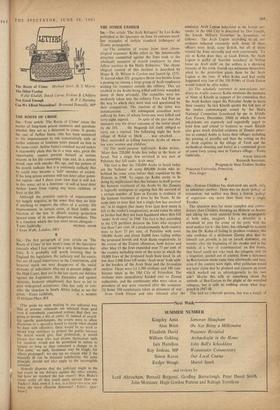SER.—The first paragraph of your article on 'The Roots of
Crime' in last week's issue of the Spectator conceals what I fear could be a very dangerous doc- trine. It is probably still worth insisting that in England the legislature, the judiciary and the execu- tive are of equal importance in the Constitution, and however much one may disapprove of the social attitudes of individuals who are at present judges of the High Court, they are in the last resort our defence against the Legislature, the Executive and against opinions, however enlightened, that have as yet to gain widespread acceptance. One has only to con- sider the situation in South Africa today to see the
[The point we were making in our editorial was that at present, criminals are released from gaol even if everybody concerned realises that they are going to resume a life of crime. If, instead of award- ing specific punishments, the courts were to allow discretion to a specialist board to decide what should be done with offenders, there would be no need to award long sentences to protect the public because the board would give that protection: it would ensure that men who had shown themselves unfit fur freedom would not be permitted to return to society so long as they remained a danger to it. 'For some,' we said, 'treatment may be tough; for others prolonged'; we can see no reason why if the mentally ill can be detained indefinitely, the same principle should not also apply to the incorrigible criminal.
Nobody disputes that the judiciary might in the last resort be our defence against the other estates, but have we reached the last resort? Was Blake's crime really all that much more serious than say Fuchs's? And, even if it was, is a forty-two-year sen- tence the most effective deterrent?---Editor, Spec- tator.]


































 Previous page
Previous page